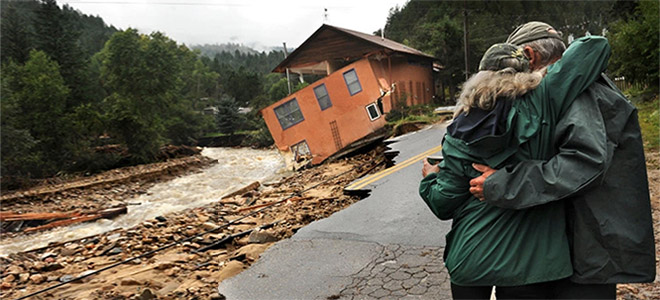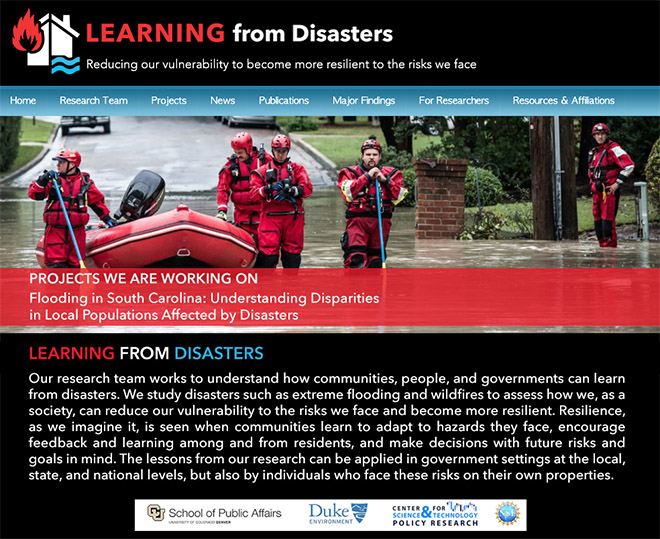Do Experiences with Extreme Weather Change Beliefs about Climate Change? Perhaps, If your Neighbors are Harmedby Deserai Crow and Elizabeth Albright |
| The CSTPR blog, Prometheus, was revived in 2016 to regularly feature content from CSTPR core faculty, research associates, postdocs, visitors, students and affiliates to serve as a resource for science and technology decision makers. This new dynamism reflects the new energies and pursuits taking place in and around CSTPR. Below we feature one of the recent Prometheus blog posts. |
Residents embrace near a washed-out home in Jamestown, Colo. on Sept. 14, 2013. Flooding hit the mountain community hard, and residents were trapped for days with no road into or out of town. Photo: Helen H. Richardson, The Denver Post. |
Leaving catastrophic damage in their path, flood damages and recovery costs across the U.S. tally in the billions annually, a cost-estimate that is likely increasing over time according to a 2008 study (Brody et al. 2008). Colorado’s catastrophic 2013 floods were one such example. The floods caused billions of dollars in damage to Colorado communities, homes and businesses, and regional infrastructure. As the climate changes, scientists warn that increasingly intense and damaging weather events will become more frequent (Coumou and Rahmstorf 2012; Intergovernmental Panel on Climate Change 2007; Karl et al. 2009). To make matters worse, households are increasingly relocating to flood-prone areas. Our work over the past 5 years has tried to understand if, how, and under what conditions individuals and communities can learn from, adapt to, and become more resilient to these climate-driven disasters. One of the important questions we sought to answer is whether those who directly experience damage from extreme climatic events – such as disastrous flooding – change their beliefs about the causes of flooding. Our research allows us to understand whether experiencing an extreme flood event changes someone’s beliefs about climate change and the role climate change may play in extreme flood events. Sudden, extreme climatic events, particularly those that cause extensive damage, often garner increased public attention to issues surrounding climate change, at least immediately after the disaster. Directly experiencing extreme weather events may shape individuals’ beliefs about the seriousness of climate change, even if the science linking global climate change to specific localized weather events is complex and uncertain (Egan and Mullin 2012; Konisky et al. 2015; Sisco et al. 2017; Spence et al. 2011). Understanding these links is critical, in part because beliefs about climate change may influence public support for policies aimed at addressing issues related to climate adaption and resilience. In local governments, we increasingly see action to mitigate and manage risks, including conversations about building resilience (Albright and Crow 2015; Brody et al. 2008; Godschalk et al. 2003). In our forthcoming paper, we examined how 903 residents in six flood-affected Colorado communities perceive the seriousness of climate change and its potential link with the floods. We specifically examine (1) the proximity and severity of flood damage to residents, focused on household, neighborhood, and/or community levels, (2) how flood damage experience may affect climate change beliefs, and (3) how demographic variables, political affiliation, and beliefs about climate change may impact perception of future risks. The findings from our study indicate that experiencing a flood does have an effect on climate change beliefs. Direct experience with a flood causing household damage is not significantly associated with climate change beliefs several years after the flood, however. Rather, it is the perception of neighborhood and community damage that is related to a greater belief in climate change and its links to the floods and future flood risks. This connection between more communal measures of flood damage and belief change is surprising and an area we intend to explore further. It also gives some element of hope in an era where we hear daily about self-interested decision-making to know that concern for community may be a motivating factor in belief changes after a disaster. |
|
Visit the research team’s website at www.learningfromdisasters.org for a full report and publications. |
The findings described here will soon be published in the journal Climatic Change under the title “Beliefs about Climate Change in the Aftermath of Extreme Flooding”. This project was funded by the National Science Foundation. Albright E.A. and Crow D.A. (2015). Learning processes, public and stakeholder engagement: Analyzing responses to Colorado’s extreme flood events of 2013. Urban Clim 14:79–93. Brody, S.D., Zahran, S., Vedlitz, A., and Grover, H. (2008). Examining the relationship between physical vulnerability and public perceptions of global climate change in the United States. Environ Behav 40(1): 72-95. Coumou, D., and Rahmstorf, S. (2012). A decade of weather extremes. Nat Clim Chang 2: 491–496. Egan, P.J. and Mullin, M. (2012). Turning personal experience into political attitudes: The effect of local weather on Americans’ perceptions about global warming. J Politics 74(3): 796-809. Godschalk, D.R., Brody, S., and Burby, R. (2003). Public participation in natural hazard mitigation policy formation: challenges for comprehensive planning. J Environ Plan Manage 46(5): 733-754. Intergovernmental Panel on Climate Change (2007). Climate change 2007: Synthesis report (Eds. Pachauri, RK, Reisinger, A). Cambridge Univ. Press. Karl, T.R., Melillo, J.M., and Peterson, T.C. (2009). Global climate change impacts in the United States Cambridge Univ Press. Konisky, D.M., Hughes, L., and Kaylor, C.H. (2015). Extreme weather events and climate change concern. Clim Chang 134(4):533-547. Sisco, M.R., Bosetti, V., and Weber, E.U. (2017). When do extreme weather events generate attention to climate change? Clim Chang 143(1-2): 227-241. Spence, A., Poortinga, W., Butler, C., and Pidgeon, N. (2011). Perceptions of climate change and willingness to save energy related to flood experience. Nat Clim Chang1(April): 46–49. |
 Deserai Crow Deserai Crowdeserai.crow@ucdenver.edu CSTPR Faculty Affiliate and Associate Professor School of Public Affairs, University of Colorado Denver |
|




 Elizabeth Albright
Elizabeth Albright